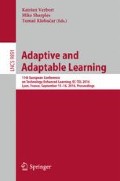Abstract
According to the recent technological advances, a new type of digital learning games has emerged. These games integrate virtual worlds persistence and immersion devices allowing the learners to experience more authentic and rich situations. Several studies highlighted their pedagogical value, knowledge transfer and learners’ engaged-behaviors. In this paper, we draw the characteristics of these learning games based on the integration of new technologies according to two characteristics: immersion and persistence. To investigate the impact of such technological components, we developed a game and evaluated it in ecological conditions. Four groups of fifteen high school students played the game through two testing conditions: two groups used a prototype allowing only classical interactions limited on usual devices, while the two other groups used a prototype integrating persistent and immersive interactions using Oculus Rift vision. All the interactions were recorded and their analysis suggests more engaged behaviors from students using the immersive and persistent prototype.
Access this chapter
Tax calculation will be finalised at checkout
Purchases are for personal use only
Notes
- 1.
- 2.
Digital Zoo: http://edgaps.org/gaps/projects/digital-zoo-2/.
- 3.
Urban Science: http://edgaps.org/gaps/projects/urban-science/.
- 4.
Science.net: http://edgaps.org/gaps/projects/science-net/.
- 5.
MMORPG: Massively Multiplayer Online Role-Playing Game.
- 6.
Massively Multilearner Online Learning Environments.
- 7.
STI2D: Science and Technology of Industry and Sustainable Development.
References
Shaffer, D.W.: Epistemic frames for epistemic games. Comput. Educ. 46, 223–234 (2006)
Hatfield, D., Shaffer, D.W.: Press play: designing an epistemic game engine for journalism. In: Proceedings of the 7th International Conference on Learning Sciences, pp. 236–242. International Society of the Learning Sciences (2006)
Boots, N.K., Strobel, J.: Equipping the designers of the future: best practices of epistemic video game design. Games Cult. (2014)
Sanchez, E., Jouneau-Sion, C., Delorme, L., Young, S., Lison, C., Kramar, N.: Fostering epistemic interactions with a digital game. A Case Study about Sustainable Development for Secondary Education
Shaffer, D.W., Gee, J.P.: before every child is left behind: how epistemic games can solve the coming crisis in education. In: WCER Working Paper No. 2005-7. Wisconsin Center for Education Research (2005)
Salmani Nodoushan, M.A.: The Shaffer-Gee perspective: can epistemic games serve education? Teach. Teach. Educ. 25, 897–901 (2009)
Shaffer, D.W., Hatfield, D., Svarovsky, G.N., Nash, P., Nulty, A., Bagley, E., Frank, K., Rupp, A.A., Mislevy, R.: Epistemic network analysis: a prototype for 21st-century assessment of learning. Int. J. Learn. Media. 1, 33–53 (2009)
Montola, M.: Exploring the edge of the magic circle: Defining pervasive games. In: Proceedings of DAC. p. 103 (2005)
Kim, J., Lee, E., Thomas, T., Dombrowski, C.: Storytelling in new media: the case of alternate reality games, 2001–2009. In: First Monday, vol. 14 (2009)
Milgram, P., Kishino, F.: A taxonomy of mixed reality visual displays. IEICE Trans. Inf. Syst. 77, 1321–1329 (1994)
Egenfeldt-Nielsen, S.: Overview of research on the educational use of video games. Digit. Kompet. 1, 184–213 (2006)
González, M.A., Santos, B.S.N., Vargas, A.R., Martín-Gutiérrez, J., Orihuela, A.R.: Virtual worlds. opportunities and challenges in the 21st century. Procedia Comput. Sci. 25, 330–337 (2013)
Guay, F., Vallerand, R.J., Blanchard, C.: On the assessment of situational intrinsic and extrinsic motivation: the situational motivation scale (SIMS). Motiv. Emot. 24, 175–213 (2000)
Bouvier, P., Sehaba, K., Lavoué, E.: A trace-based approach to identifying users’ engagement and qualifying their engaged-behaviours in interactive systems: application to a social game. User Model. User-Adapt. Interact. 24, 413–451 (2014)
Ryan, R.M., Deci, E.L.: Self-determination theory and the facilitation of intrinsic motivation, social development, and well-being. Am. Psychol. 55, 68–78 (2000)
Iksal, S.: A declarative and operationalized language for learning systems analysis. In: UTL (2011)
Acknowledgements
These experiments were made possible by funding from the French National Research Agency (ANR-13-APPR-0001).
Author information
Authors and Affiliations
Corresponding author
Editor information
Editors and Affiliations
Rights and permissions
Copyright information
© 2016 Springer International Publishing Switzerland
About this paper
Cite this paper
Loup, G., Serna, A., Iksal, S., George, S. (2016). Immersion and Persistence: Improving Learners’ Engagement in Authentic Learning Situations. In: Verbert, K., Sharples, M., Klobučar, T. (eds) Adaptive and Adaptable Learning. EC-TEL 2016. Lecture Notes in Computer Science(), vol 9891. Springer, Cham. https://doi.org/10.1007/978-3-319-45153-4_35
Download citation
DOI: https://doi.org/10.1007/978-3-319-45153-4_35
Published:
Publisher Name: Springer, Cham
Print ISBN: 978-3-319-45152-7
Online ISBN: 978-3-319-45153-4
eBook Packages: Computer ScienceComputer Science (R0)

